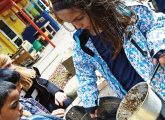Dr Helen Edwards provides some tips to help get you started with reflective practice in Early Years…
Reflective practice is all about focusing on what is working, adapting what isn’t and continuing to grow and improve teaching and learning experiences for children. Here are some practical ideas that you might want to implement.
Reflection starts with a simple ‘taking stock’: the process of stepping back, thinking about what we have been doing, what has gone well, and what could be better.
Here are some helpful ‘taking stock’ questions:
Remember to celebrate all the things that have worked well. It’s so easy to slip into the treadmill of ‘what next?’ and a never-ending to do list.
Make sure you acknowledge the really good things, share with your colleagues and congratulate others.
There will be areas where you feel things could be improved. Think about quick wins that would solve some immediate problems.
Sometimes reflective practice can sound like we need to tuck ourselves away in silence before we can even start. I don’t know any practitioners that can do that easily!
Instead, think about ‘active reflection’, something that can be part of your day-to-day practice.
Lockdown forced many of us to embrace the use of technology more fully. We saw this first-hand at Tapestry where the number of videos and postings increased dramatically as practitioners devised new ways to support children’s learning at home.
As educators become more confident about technology, it can be used as a tool to benefit reflective practice too.
You could use video, perhaps with a voiceover to support your reflection. Visual and audio communication can be easier to share and feel more accessible to busy staff, and can require less explanation.
The ethos of a setting is at the heart of creating a culture of reflective practice. Writing about how to get this right could fill lots of articles and many books.
However, leaders and managers are key here. Simple things like modelling the right language can make a considerable difference, for example “What would happen if…..?” or “I wonder if we could change….?”
Questions like this encourage us to pause for thought and reflect.
A simple option is to have a weekly ‘reflective question’ which is shared with everyone. These questions might be good options:
Inviting everyone to contribute is important. It ensures that all feel their views are valued and that their reflections can help to improve the experience and learning of children.
Dr Helen Edwards is co-founder of Tapestry, an online learning journal for early years and schools which encourages reflective practice. For more information visit tapestry.info.

Oral language – Laying the foundations in early years
Editors picks

Maths outdoors EYFS – Maths activities to try outside
Editors picks
